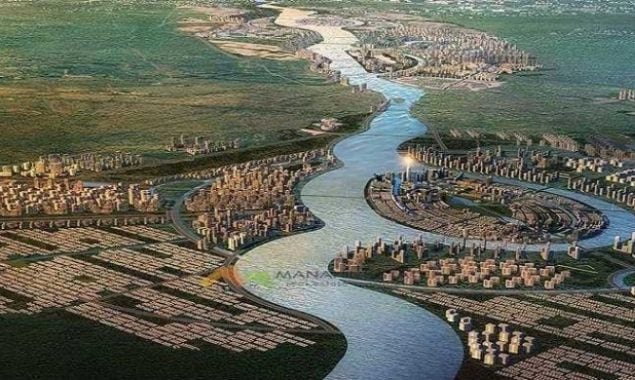
Ravi Riverfront Urban Development Project. Image: File
LAHORE: The Lahore High Court (LHC) on Tuesday scrapped government’s billion dollars Ravi Riverfront Urban Development Project (RRUDP), ruling that the agricultural land can’t be acquired for the project.
The RRUDP is an urban development megaproject in Lahore that runs along the Ravi River. It includes construction of a 40,000-hectare (100,000-acre) planned city and rehabilitation of the Ravi River into a perennial freshwater body. It is expected to be the largest riverfront of the world when finished. As of January 2021, it had attracted US$8 billion in foreign investment.
Accepting a set of petitions challenging the land acquisition for the RRUDP and violations of environmental laws by the Ravi Urban Development Authority (Ruda), Justice Shahid Karim declared different provisions of RUDA (Amendment) Act unconstitutional saying it was issued in violation of Article 120 of the Constitution.
Read more: LHC reserves verdict on petitions against Ravi Riverfront project
The master plan of the project is the basic document but the Ruda failed to formulate master plan under the law. Any scheme made without a master plan is illegal, the court ruled, adding that all schemes are subject to master plan.
The court held that Section 4 of the Ruda Amendment Ordinance contradicted Article 144A of the Constitution as the amendment ordinance also failed to meet the requirements under the Constitution. Agricultural land can be acquired only when there is a regular legal framework, the court ruled.
The court further set aside the notification regarding acquisition of land under Section 4 of Land Acquisition Act 1894 and observed that land acquisition was done in violation of the said law. The land acquisition collectors of Lahore and Sheikhupura failed to abide by law in acquiring land, the court said. The high court observed that the rules and regulation for the project had not been followed as the master plan of the project was made without cooperation of the local government. The court also ruled that loans for the project were obtained illegally and Ruda should pay back the loans borrowed from the Punjab government.
The LHC ordered setting environmental standards for the project within a month.
Justice Karim had reserved the verdict on December 21 after all the parties had concluded their arguments.
Previously, Advocate General of Punjab (AGP) Ahmad Awais had advanced his arguments in favour of the project. He had opposed the petitions saying the project was of public importance and the court lacked jurisdiction to interfere in the policy affairs of the government.
The AGP had further argued that since the amended ordinance had been issued to cover legal infirmities and the petitions had become infructuous. He had also argued that the courts could not interfere in the policy matters.
However, Justice Karim did not agree with him and observed that the courts could interfere in policy matters if it infringed fundamental rights of the citizens.
Advocate Amina Qadir, who was appointed as amicus curiae by the court, submitted that the project in question was not of public purpose. She said the government had been unable to justify the project keeping in view the public trust doctrine as Punjab would be deprived of its fertile plains.
She further said that there was no adequate compensation mechanism defined for the people whose land had been forcibly acquired.
Previously, Ruda’s counsel Barrister Ali Zafar in his concluding arguments had argued that the project was environment-friendly and would ensure conservation, clean air for Lahore and include within it a massive forest.
He said Ruda budget has been approved by the provincial assembly and when a project is included in the budget, its nature is altogether different.
Read more: LHC rebukes govt for overlooking illegal housing schemes for Ravi Riverfront project
The farmers, land owners and developers had filed the petitions through lawyers Sheraz Zaka, Ahmad Rafay Alam, Waqar A. Sheikh and others.
The petitioners challenged the mode and manner of the land acquisition proceedings undertaken by Ruda for the project. They said the land acquisition collector, despite a protest by the landowners, passed 18 awards on a single day amounting to multiple billion rupees.
The petitioners also challenged the legality of forceful acquisitions of land for commercial purposes under the Land Acquisition Act, 1894. Some of the petitioners questioned the legality of the Environment Impact Assessment of the project prepared by a non-registered consultant.
The judge had stayed the process of land acquisition for not meeting the legal requirements and environmental laws.
The petitioner’s counsel had argued that section 29, 30 and 31 of the Ruda Act relating to land acquisition contradicted Article 24 of the Constitution.
They said Ruda could not be compared to the LDA as the Board of directors of Ruda included all bureaucrats. They pointed out that public representatives are also included in the board of LDA but no public representative was added in Ruda.
Read More News On
Catch all the Pakistan News, Breaking News Event and Latest News Updates on The BOL News
Download The BOL News App to get the Daily News Update & Follow us on Google News.




